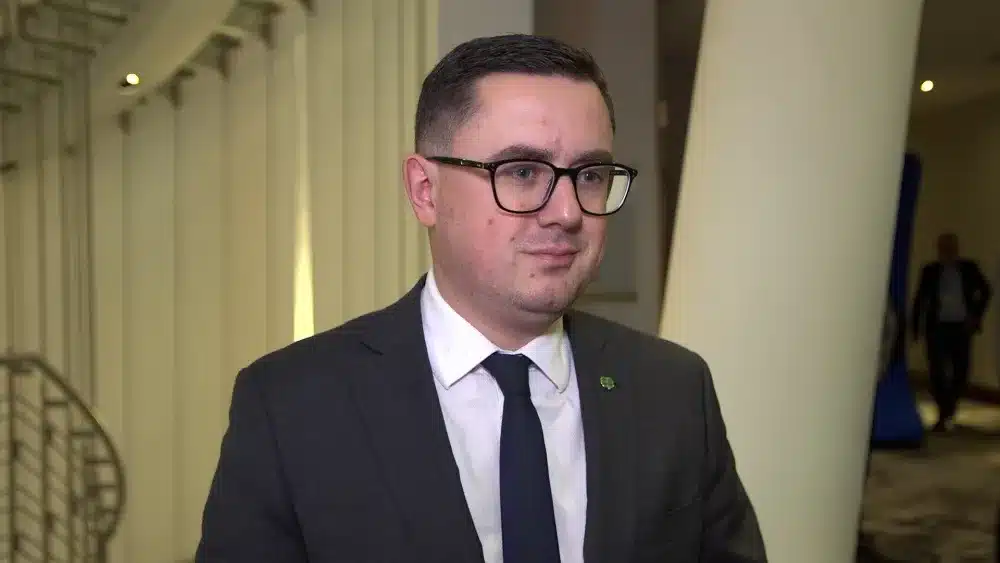The lack of energy storage is one of the largest barriers in the development of renewable energy. However, they are gradually gaining interest from energy companies and individual investors alike. New policies anticipated by the government aim to stimulate investments in this area, which can also be significant for the Polish industry.
“We have a major challenge in terms of energy transition in Poland. We are developing new capacities from renewable energy sources, creating a mix based on nuclear energy in the future, and developing renewable energy sources. We invest in transmission networks, but we can’t forget about the energy balance and grid stabilisation. Energy storage comes to the rescue in this sector, which, as we can see from new investments, will grow immensely” – states Miłosz Motyka, Undersecretary of State in the Ministry of Climate and Environment, in a conversation with Newseria Biznes agency.
In October 2024, 33.3% (4.5 TWh) of the produced electrical energy came from renewable sources, 4.8 pp. (0.4 TWh) more than the previous year. Nearly half of the renewable energy generation (2.1 TWh) came from wind sources, and 1.1 TWh from PV installations, as indicates the data from Forum Energii think tank. As URE (Energy Regulatory Office) points out, energy storage technologies are a crucial element of the energy transition. They allow to manage consumption and more efficiently use energy generated from renewable sources. They also stabilise the operation of the electrical network and increase its flexibility, and offer an alternative to more expensive and time-consuming investments in expanding traditional lines and power stations.
“We need to have the ability to adequately store excess production from renewable energy sources. From the perspective of our industry and the construction of local content, it’s another area where we can invest in the Polish industry and utilize the experience of people formerly employed in the power industry in industrial sectors. It’s a huge chance for new job positions. Today, over 200,000 people work in the renewable energy sector. This boom will get even larger thanks to energy storage, which will develop rapidly in the upcoming months and years,” assures Miłosz Motyka.
The Energy Regulatory Office, in its report “Electric Energy Storage”, informs that in May this year, 12 energy storage systems with a total installed power capacity of 1464.5 MW are listed in the registers of the five largest distribution system operators and transmission system operators. Storage systems ranging from 50 kWh to 10 MW are subject to registration, and bigger ones require obtaining a license from the URE president (up to May 2024, 41 applications for storage systems have been submitted). Half of these 12 storages use lithium-ion battery-based technology. The largest storage facilities in terms of installed power capacity are pumped-storage power plants, which make up 85% of the total power capacity of storages in the registers.
According to Forum Energii’s analysis “Energy Transformation in Poland”, pumping water at pumped-storage power plants in 2023 required 1.9 TWh of electric energy, i.e., 1.1% of domestic gross consumption. These units produced 1.3 TWh, so the efficiency of these energy storage facilities was 71.6%. For another consecutive year, pumped-storage power plants were utilised to a record degree – by 26% more than in 2022.
“Without energy storage, there is no grid stabilisation, which means we do not effectively have energy security. Therefore, we are negotiating with companies about a support system for large energy storage and power plants. We are also strongly emphasising programmes in the area of prosumer energy storage,” points out the Undersecretary of State in the Ministry of Climate and Environment. “In the ‘My Current 6.0’ programme, we introduce an energy storage obligation for photovoltaic installation. Today, when we deal with such large renewable energy surpluses, often with decommissioned photovoltaic installations, citizens who want to produce energy can also supply it to the grid, store it. We see how successful this change has been, how enthusiastically it has been welcomed not only by the industry but also by the prosumers themselves, so we will continue to support it.”
Investing in their own energy storage is a completing element of home photovoltaics for individual investors, it increases the efficiency of such installations, maximises self-consumption, and allows to lower the amount of electricity bills. Instead of the planned 400 million PLN, more than 1.2 billion PLN will be forwarded to the programme.
“We will prepare a grid law directly addressing the issues of storage, their development, to ensure that they are present in the grid, and we can invite companies to participate. We also see a need for investment on the part of energy companies to invest in energy storage. There are prepared legislative projects in the ministry’s plans, which will soon be included in the work list and will be subject to work in parliament and the government to improve network issues and storage facilities” announces Miłosz Motyka.
The Energy Law will include a provision that will enable prosumers to invest in larger energy storage. So far, in accordance with the legislation, the capacity of the storage could not exceed the capacity of the photovoltaic microinstallation. Thanks to the provisions in the draft amendment to the Act on Investments in Wind Power Plants prepared by the Ministry of Climate and Environment, the capacity of the prosumer’s energy storage will be allowed to be 2.2 times the capacity of the microinstallation.
“The Ministry is working on virtually every aspect of renewable energy sources: speeding up procedures, distance law regarding onshore wind power plants, a law encompassing better settlement for prosumers. We are preparing a network law addressing connection conditions, often unachieved, to which issues related to dealing with these connections are added – we want to settle that. We are also addressing issues related to energy communities where we are dealing with network stability at the local level. Finally, we are working on a law on marine wind energy and a law that will map areas of accelerated renewable energy development,” lists Miłosz Motyka.
